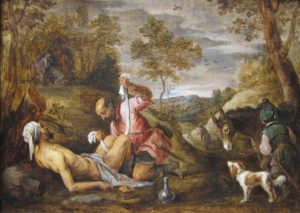Today’s Gospel from St. Luke (10: 25-37) is one of Jesus’ great instructions regarding practical and concrete love. With the story of the Good Samaritan, Jesus develops the Greatest Commandment, to love God with your whole heart and your neighbor as yourself. Authentic love draws one out of self into relationship; with God and with others.
It is not possible to truly love God without a concrete exercise of charity in our relationships. St. James says as much: “Demonstrate your faith to me without works, and I will demonstrate my faith to you from my works.” (James 2:18)
In today’s Gospel, the scholar of the law shows ‘knowledge’ of the law, but has he understood the teaching in a manner that leads to conversion of heart and application in relationships? This is the true challenge of the Gospel for all of us. We have read and heard these Gospel stories many times, and perhaps can readily recite the Catechism, but have our hearts been moved with mercy?
To live as a disciple of Jesus is a life-long journey. This journey begins at birth; it begins in the family. Parents love their children, instinctively (not necessarily effortlessly.) Parents share their faith with their children. They read them bible stories, teach them prayers, take them to church, and make sure they receive instruction in the faith and receive the Sacraments. In the family, a child grows up knowing they are loved, and learning how to love others. In the family, a child learns how to share and how to forgive, as well as how to say “I am sorry.”
This is why families are so important. It is in the family that we learn to become good members of a broader society. This is why it is also important for parents to love each other and raise their children in loving homes. Likewise, the faith-family of the Church is important to a healthy society. The faith teaches and promotes the moral values that are essential to healthy society.

The Good Samaritan by David Teniers
Today’s Gospel of the Good Samaritan is not just about one good person taking care of one person in need. It is certainly that – but so much more. Very subtly it tells us there is no place for violence in society. Clearly, violence does damage to persons and the human family.
However, due to the human condition, there is violence in our world, and we must be prepared to heal the results of violence with mercy. We must have hearts that are moved by violence to respond with love. People who have experienced what it is to be loved (both by God and others) are more likely to be moved by such love towards compassion.
To simply walk past someone in need, ignoring them does nothing to improve the condition of that person, nor anything to improve the broader society. Jesus clearly indicates that such indifference is not acceptable.
Notice also that the Good Samaritan does not respond with protests or marches. Without fanfare, he acknowledges the human person before him. He enters into a relationship. He touches, he speaks, he cares, he acts with love, binding the wounds of both body and spirit.
Our love for neighbor is called to recognize not only individual needs, but the needs of the many. And to not only meet human needs, but to address the social structures of sin that create these needs. Here is what the Church’s Social Doctrine teaches:
Social and political charity is not exhausted in relationships between individuals but spreads into the network formed by these relationships, which is precisely the social and political community; it intervenes in this context seeking the greatest good for the community in its entirety. In so many aspects the neighbor to be loved is found “in society,” such that to love him concretely, assist him in his needs or in his indigence may mean something different than it means on the mere level of relationships between individuals. To love him on the social level means, depending on the situations, to make use of social mediations to improve his life or to remove social factors that cause his indigence. It is undoubtedly an act of love, the work of mercy by which one responds here and now to a real and impelling need of one’s neighbor, but it is an equally indispensable act of love to strive to organize and structure society so that one’s neighbor will not find himself in poverty, above all when this becomes a situation within which an immense number of people and entire populations must struggle, and when it takes on the proportions of a true worldwide social issue. (Compendium Of The Social Doctrine Of The Church #208)
Jesus is THE Good Samaritan, who has entered the human condition, to lift us from the ditch of misery created by sin. Jesus is the great Physician who has treated and bound our wounds with the blood of his cross. Jesus through his resurrection has restored us to life. Jesus’ love for and faithfulness to the Father is manifest in his salvific love for us.
We are to ‘go and do likewise.’
+pde